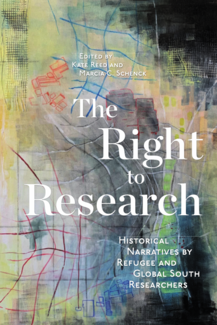Global History Lab Refugees' Essays Compiled in New Collection
Refugees and displaced people rarely figure as historical actors, and almost never as historical narrators. We often assume a person residing in a refugee camp, lacking funding, training, social networks, and other material resources that enable the research and writing of academic history, cannot be a historian because a historian cannot be a person residing in a refugee camp.

The Right to Research disrupts this tautology by featuring nine works by refugee and host-community researchers from across Africa, Europe, and the Middle East, all of whom conducted their research under the auspices of the Global History Dialogues Project: Gerawork Teferra, Ismail Alkhateeb, Lazha Taha, Phocas Maniraguha, Muna Omar, Aime Parfait Emerusenge, Richesse Ndiritiro, Sandrine Cyuzuzo, and Alain Jules Hirwa. Identifying the intrinsic challenges of making space for diverse voices within a research framework and infrastructure that is inherently unequal, this edited volume offers a critical reflection on what history means, who narrates it, and what happens when those long excluded from authorship bring their knowledge and perspectives to bear. Chapters address topics such as education in Kakuma
Refugee Camp, the political power of hip-hop in Rwanda, women migrants to Yemen, and the development of photojournalism in Kurdistan. Exploring what it means to become a researcher, The Right to Research understands historical scholarship as an ongoing conversation – one in which we all have a right to participate.
